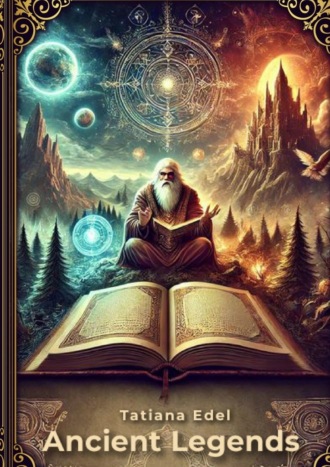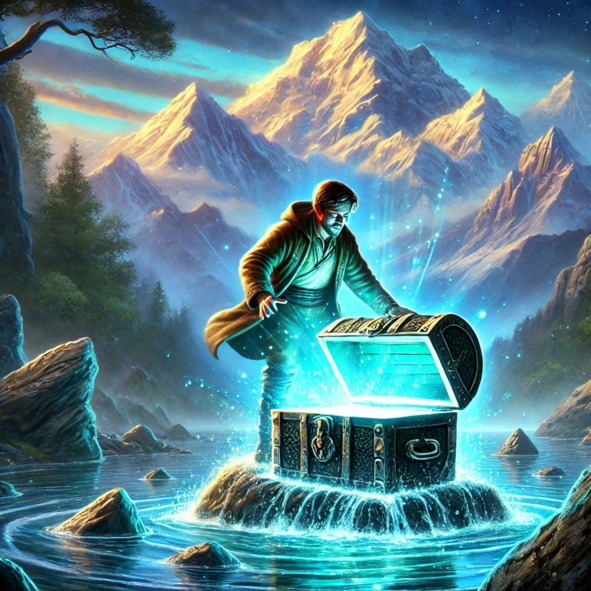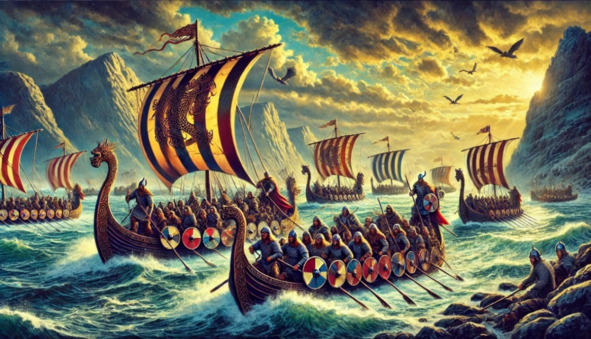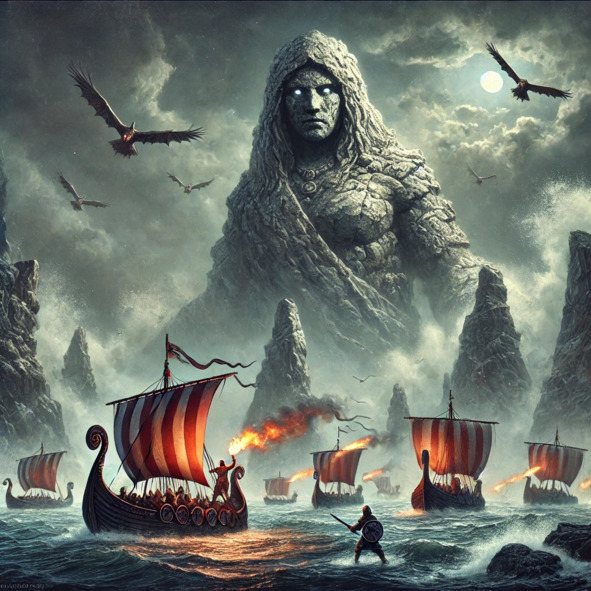
Полная версия
Ancient Legends

Ancient Legends
Tatiana Edel
© Tatiana Edel, 2025
ISBN 978-5-0065-6589-0
Created with Ridero smart publishing system
Tatiana Edel
Ancient Legends
2025г
This is a book of unusual fairy tales and legends that I wrote for children while gazing at the paintings of the great Russian artist, Nicholas Roerich.
Modern children love fantastic and magical stories, so I decided to create illustrations using generative artificial intelligence.
If you enjoy these tales and legends, I hope you will also want to learn more about the man who inspired them – Nicholas Roerich. Over the course of his life, this remarkable artist created more than seven thousand paintings. His name is known around the world, and in India, where he lived for nearly half his life, he is revered as a sage. And that is no surprise. Nicholas Roerich was not just a painter – he was also a writer, a scholar, a philosopher, and a great traveler.
He journeyed through ancient Russian cities, Scandinavia, America, and Europe. But his most extraordinary expedition was through many countries of Central Asia – the oldest region of our planet. There, Roerich studied the customs, beliefs, and way of life of the peoples who lived in these lands, marveling at their profound wisdom and centuries-old cultural treasures.
Roerich’s expedition crossed the dense Siberian taiga, the blooming meadows of Altai, the scorching steppes of Mongolia, the highlands of Tibet – called the “Roof of the World” – as well as China and the towering mountain passes of the Himalayas, the highest peaks on Earth. In his paintings, filled with vibrant colors, he captured an indescribable beauty – the sacred lands of our world bathed in golden and crimson sunrises and sunsets, fiery clouds and pearlescent mists, breathtaking northern lights, and the crystal-clear blue of the sky.
I am deeply inspired by the work of Nicholas Roerich, and I want you to love his paintings with all your heart, too. And as you grow older, I hope you will take an interest in his spiritual revelations and his thoughts on the role of beauty in our lives. After all, Beauty is what fills a person with qualities such as Heroism, Kindness, and a Love for all that is noble and sublime.
Read, discover, and enjoy.
Yours,
Tatiana Edel
Contents
– The Buried Treasure ………………………………………………….
– The Tale of the Varangians …………………………………………
– The Waterfall’s Song ………………………………………………….
– The Life-Giving Spring…………………………………………………
– The Flying Carpet ……………………………………………………….
– The Guardians of the Desert ……………………………………….
– Buddha the Victor……………………………………………………….
– The Legend of the Maid of Orléans……………………………….
– The Tale of Geser Khan ……………………………………………….
– The Bear Groom ………………………………………………………….
– The Legend of Atlantis …………………………………………………
– The Emperor’s Love …………………………………………………….
– The Fire Enchanter ………………………………………………………
– The Lonely Wanderer ………………………………………………….
– The Messenger of the White Burkhan ……………………………..
– Sacred Shambhala…………………………………………………………
– The Hidden Treasure …………………………………………………..
– The Mountain of Gems ……………………………………………………
– The Legend of the Book of Life …………………………………………
– Above the Mountains ………………………………………………………
– Beyond the Seas, Great Lands ………………………………………….
– Drops of Life …………………………………………………………………….
– Snezhana ……………………………………………………………………….
– Svyatogor ……………………………………………………………………….
– The Wise Woman …………………………………………………………….
– The Lord of the Night ………………………………………………………
– Nastasya Mikulichna ……………………………………………………….
– The Song of the Morning …………………………………………………….
– Ilya Muromets …………………………………………………………………
Buried treasure
In ancient times, people survived by what they could gather in the forest or the fields, in the mountains or the rivers. Centuries passed, and much changed in human life. People learned to tan leather and furs, build grand houses, craft machines, paint masterpieces, and sculpt statues. There was no limit to the skill of human hands.
But people valued these achievements differently: some admired and cherished the creations of great masters, while others bought and collected them merely for prestige and profit. And some cared nothing for them at all. Yet there was one thing that captivated everyone – gold, jewels, and wealth. The more people amassed, the stronger their hunger for riches grew. Wars began, not for honor or justice, but to plunder prosperous cities and nations. And in their greed, people cared little for preserving the treasures of art and culture. Palaces burned, taking with them the paintings of great artists, destroying the spiritual wealth of entire peoples.
One wise old man decided to bury a message for future generations. In it, he entrusted them with a truth – one hidden from the world. This treasure was a symbol of all human knowledge and the spiritual wealth of a true creator.
He took a boat and rowed to the center of a mountain lake. There, with great care, he lowered a small chest into the water, entrusting this legacy to those who would one day be ready to receive it.
That lake lay in a deep mountain gorge, guarded by an evil sorceress. She set many perilous traps for those who dared seek the hidden treasure. Yet, adventurers came, climbing treacherous mountain paths, hoping to claim the prize – only to find their final resting place instead.
Wars raged. Feuds forced people to flee their homes and take refuge in the mountains. And so it happened that one family found themselves in a new land. Life there was hard – nothing but cliffs surrounded them, and there was no land to sow grain. They survived on the fish from the lake, which was so plentiful that feeding the family required little effort. But their existence was dull. Cut off from the world, they knew nothing of the great land beyond the mountains – whether wars had ended, if peace had returned, or if the fires of hatred still burned. Often, they would sit together, gazing into the distance, hoping to see a traveler appear with news of the world.
Time passed, and the family’s son, Ivan, grew restless. He no longer wished to sit idly, sighing in uncertainty. He longed for adventure, for knowledge, for the vast world beyond. Seeing this, his father spoke to him:
“There are many hidden treasures in the Russian land. But the most important treasure does not contain silver or gold. No – within it lies the very essence of human life. Yet no one has ever found it. Only one with a pure heart may uncover this secret. A man of greed, who seeks riches only for himself, will never see it. Even if he stands in the right place, mysterious forces will lead him astray, leaving him lost forever.”
But Ivan was not afraid. His resolve only grew stronger. He wanted to uncover the meaning of life, to witness the unseen, and to bring happiness to all people. His father blessed him, placed him in a boat, and the family watched as he drifted away, hoping for his safe return and the good news he would bring. His mother, day and night, sat upon a rock, watching the horizon.
Ivan sailed for a long time. A gentle wind carried his boat forward, guiding him on his journey. He did not know where any treasure might be buried, nor which path would lead him there.
He crossed the lake, climbed the mountains, and wandered through valleys – but the treasure did not appear. Along the way, he performed good deeds, helping the weak and standing beside the strong to defend their land from invaders. He mastered many skills and trades, and at last, he decided it was time to return home. The mountains called to him – he knew his family had never stopped waiting for him.
At last, he reached his homeland. The lake lay before him, shimmering in the sun. But as he approached, a thick mist rose over the water, and from within it, a boat slowly emerged. In it sat a silent figure.
“Hey!” Ivan called. “Good health to you! Where are you headed?”
The stranger did not reply, and his boat did not move. Then, suddenly, a bright ray of light burst through the mountain peaks, tearing the mist apart. In an instant, the mysterious traveler vanished – and with him, the sorceress’s dark magic disappeared. The light had triumphed over darkness.
At first, Ivan was startled, but as the sun illuminated the mountain peaks, casting its golden glow upon the lake, a great joy filled his heart. He understood – this had been the Messenger of the Himalayas, the one the elders spoke of. It was a sign: he was on the right path.
Yet, something was wrong – his boat would not move. Had it snagged on something? He would have to dive in and find out.
Taking a deep breath, he plunged into the water. It was crystal clear, revealing the depths below. As he opened his eyes, he saw something resting on the lakebed – a small chest, glowing with a bright, ethereal blue light.
Ivan resurfaced, filled his lungs with air, and dove again, this time reaching for the chest. He grasped it and returned to the boat. Turning it over in his hands, he saw no keyhole, yet it would not open. No matter, he thought. I will open it at home. He set off toward the shore.
There, his family waited, as they always had. His mother wept with joy, his father beamed with pride – Ivan had returned, and he had brought a great gift with him. At a glance, his father understood: this was the buried treasure.

And then, as soon as Ivan stepped onto the shore, the chest let out a soft chime – and opened on its own.
A quiet melody flowed from within, seeping into their hearts. And with it came a great awakening. Their spirits were lifted, their strength renewed, and a deep, noble purpose filled their souls.
“No more sitting here in waiting,” Ivan declared. “It is time to return to the people. To build a new life and serve the Light.”
“Oh, my son,” his mother whispered, “last night, I had a dream. I saw us living in a grand house, adorned with carved wood. I saw the Prophet Elijah himself harvesting rye in our fields. Saint George tending our horses. Saint Nicholas watching over our herds. And a musician – a guslar – came to our home, singing of the highest wisdom, the kind that brings true joy. And we were given that joy because we worked with honest hands and a pure heart. Such a dream I had!”
“That,” Ivan said, “is how a person should live – if his soul serves the Light, bringing goodness and knowledge to his people.”
He helped his parents into the boat, and together, they set off toward the world. And all the while, the chest in their hands glowed softly, carrying forth its sacred Blessing.
The Tale of the Varangians
I will tell you of ancient times, of distant lands known as Scandinavia. When the calendar had only just marked the fifth century, a great misfortune befell the northern lands. Endless rains fell for days and nights, rivers overflowed their banks, and roads turned to impassable swamps. The sun ceased to shine with its bright, life-giving light. Instead, it glowed dimly, like the moon, its rays hidden. Even at midday, the sunlight was not golden but bluish, and objects cast no shadows.
A massive meteorite had struck the earth, and to make matters worse, a volcano erupted, spewing ash into the sky. A black dust swirled in the air, making it hard to breathe. A bitter cold gripped the land – so severe that even the northern folk, accustomed to harsh winters, shivered under its weight.
In fertile Sweden, vast plains stretched wide, perfect for growing grain and grazing livestock. But in neighboring Norway, a land of mountains and fjords, there were only narrow strips of arable land. Most people survived by fishing. Yet in those days, there were no modern nets or tools, and life was hard. Sons were born, but there was no land left for them to inherit. So, little by little, people abandoned their farms and set off into the unknown, searching for new lands where they might find a better life.
Three hundred years passed before the sun shone once more over Scandinavia. Fields bloomed again, villages thrived, and new generations were born and raised. But once again, there was not enough land for everyone. And so, the northern people turned their gaze to the south. There, fertile lands lay waiting – low-lying coasts with rich soil, where livestock could graze freely.
The Scandinavians had long been known for their skill in building ships. They crafted such magnificent longships that they belonged in a museum. Each ship was manned by twenty rowers, who took turns at the oars every hour. These ships were so well-built that they could cross both shallow waters and narrow rivers with ease. The men who sailed them were called Vikings.
Many rivers, seas, and new lands fell under their command. Their swift ships reached the shores of Greenland and North America five hundred years before Christopher Columbus opened the way for the rest of the world. Such were these men.

Of course, not all Norwegians set out to conquer new lands. Many remained peaceful farmers and merchants. Some expeditions were sent solely for trade, to exchange goods in distant lands. Their devoted wives would bid them farewell with tears in their eyes, never knowing if they would return – for the seas were treacherous, and battles in far-off lands were ruthless.
In one village, there lived a farmer named Ari with his family. When hard times came, he decided to prepare a ship and sail beyond the seas – to trade his goods and see the lands beyond. Two of his closest friends chose to join him, loading their own wares onto the vessel.
But none of them knew that, along with their cargo, something sinister had found its way aboard – the seeds of an evil, enchanted weed. These cursed plants grew at an unnatural speed, sprouting massive, living vines. They longed for a new home, despising the rocky shores of Norway. They sought soft, fertile soil where they could spread endlessly, choking out all life with their tangled roots.
On the first day, the ships sailed smoothly. On the second day, Ari noticed something strange – a faint creaking sound from the hull. He mentioned it to his companions. They listened carefully, and indeed; a deep, eerie crackling echoed through the wooden planks.
They went below deck to inspect their cargo, and there, twisted, gnarled roots had already spread their tendrils across the sacks of trade goods. Worse still, the vines hissed when they approached, as if guarding their domain.
The sailors gathered for counsel. They knew that wood could not sink, but fire was the only thing that could destroy these cursed roots. Yet, if they set them ablaze, they would burn their own ship along with them.
By the third day, the roots had grown even more, strangling the ship’s hull until it groaned under the pressure. Just as despair crept into their hearts, a great rock formation appeared ahead.
Ari suggested sending a scout to the rocky island. Perhaps there was a place to land and rid themselves of the cursed vines before it was too late. They chose the strongest swimmer, who dived into the water and set off toward the towering rock.
The great stone standing in the Vikings’ path was known to the people as Giantess Krimgerd. She loomed over the sea, her gray, craggy body rising from the depths like an ancient, watchful woman. Many ships had wrecked upon her cliffs, and countless whirlpools had swallowed brave sailor’s whole. But the Giantess Krimgerd was not without mercy. She did not harm merchant vessels. Instead, she allowed them to pass unharmed, silencing the whirlpools while they sailed by.
That day, Krimgerd saw two beautiful long ships, finely carved and richly adorned. She thought to herself, these must be merchants, come to trade. They mean no harm. She prepared to drift into a peaceful slumber – when suddenly, she noticed a lone swimmer approaching her shore. The giantess grew wary. She waited in silence.
The Viking scout reached the rocky coast, but the cliffs were too steep – he could not climb onto the land. Desperate, he called out:
“O noble Giantess Krimgerd! Help us rid ourselves of these terrible creatures! These cursed roots will sink our ships, leaving our children without fathers and our wives without husbands. They will perish in hunger and grief!”

Krimgerd pondered his plea. Then, with a whisper, she loosened a small piece of rock, creating a foothold for him to climb. Leaning in, she murmured, “On the leeward side of my cliffs, you will find a low shore, a wide plateau. There, you may cast out the roots and destroy them.” The scout rejoiced, leapt into the sea, and swam back to the ship.
When he returned, he shared Krimgerd’s advice with the crew. Overjoyed, the Vikings prepared for battle. They built sturdy gangplanks to disembark and gathered torches, knowing fire was their only weapon. As they approached the rock, they set their torches ablaze and burned the cursed roots.
The monstrous vines writhed and shrieked, twisting in agony, but after that, they no longer lashed out at the men. Their strength had been in their wicked tendrils, and once those were scorched, their power faded. The sailors dragged the remaining roots onto the plateau of the rock and set them alight. A terrible hissing and crackling filled the air, but soon, only ashes remained. Krimgerd felt nothing.
The sailors bowed low, thanking the giantess with all their hearts. They swore to pass down the tale of her kindness for generations to come. And so, the fathers told their sons, and the sons told their own children, until at last, the tale reached us. To this day, the Great Rock stands in silent watch, warning all would-be invaders that even the mountains themselves will rise to protect their people when the need arises.
The Song of the Waterfall
In a mountain village, there lived a beautiful girl named Jita, which means “Song.” She was so lovely that words could scarcely do her justice. Her hair was darker than the night, her eyes brighter than flames, her waist as slender as a wasp’s, and her hips curved as if sculpted by an artist. Jita loved listening to music, but she was different in that she heard it everywhere. While others might hear the melody of a stream or the rustle of the wind, Jita could hear the whispers of the grass and converse with the branches of the white birch. From all these sounds, she wove songs and sang them tirelessly. Her soul longed for beauty, and music nourished her heart, which would not have been able to strive toward the Light without the harmony of sound. The kind-hearted people who listened to her felt as if they were part of a magnificent performance. The symphony of humanity united hearts.
For this, she was known in the village as the One Who Hears. She understood the language of birds as if it were human speech. But not everyone admired her. Especially envious were the young women whose suitors praised Jita’s beauty and talent. The jealous ones began spreading rumors, saying she was not of this world and should leave for the heavens. Let her sing with Orpheus there, they sneered. And deep down, they wished for Jita to go deaf forever, so she would never hear the songs of birds or the melodies of water again.
Far away in the mountains, on a copper peak, lived Mahakala, the Wrathful Guardian, as people called him. He was a fearsome deity that tested the strength of human spirits, ready to scorch all living things with his fire. One day, in a fiery rage, Mahakala unleashed a blaze so fierce that all sounds on earth fell silent. Completely silent.
For some, this was nothing – just silence. But for Jita, it was a tragedy. For her, the meaning of life was gone, and perhaps life itself. The girl grew despondent and stopped going outside. She sat by the window, listening intently until her ears ached, hoping for some sound to break the silence and bring joy to her heart. But nothing could be heard.
In that same village lived a young man named Dordje. He loved the One Who Hears with all his heart. Day and night, he pondered how to help his beloved and bring sound back to the earth. So he went to the old sage in the mountains to seek advice. The sage told him that for the wish to be granted, a brave man must face Mahakala, standing directly before his fierce eyes and fiery mouth, enduring for three days and three nights. If he stood firm and showed no fear, the power of the terrible giant would be broken, and the people would be freed from this fearsome deity forever.
“I’ll go,” said Dordje. “I’ll do anything for the happiness of the people.”
“Then take this sacred bell and this magical dagger. They are amulets, protective relics. With their help, you can approach the giant and quell his wrath, if you hold out until noon on the third day,” the sage said, handing him the protective items.
Dordje bowed to the wise man, took the dagger and bell, and set off on his long journey. He crossed many mountains – descending one only to find another blocking his path, with no way around. His faithful horse grew exhausted, so Dordje left him at the foot of the tallest copper mountain, to wait there in case his master returned alive.
With great effort, Dordje finally reached the summit and saw, in the distance, a red sea – it was Mahakala’s lair. Dordje chose a suitable ledge on the rock and rang the bell with all his might.

At that very moment, the sky and mountains turned orange and crimson. It grew so hot that it was as if a fire had been lit beneath Dordje’s feet. The brave young man endured it, holding the bell before him and using the dagger to cut away the tongues of flame that Mahakala, the fiery beast, sent his way. The giant appeared in all his terrifying glory – his head as large as a mountain, eyes like two flaming orbs, with a third eye burning on his forehead. His crown was adorned with human skulls, and flames burst from his mouth.
But Dordje stared straight into the giant’s eyes, without flinching. Mahakala spewed fire at him, but Dordje cut away the flames with his dagger. His faith in the Light held and protected him.
By the end of the second day, Mahakala grew restless; it seemed he had even shrunk in size. Still, he puffed and breathed fire. Though the heat was unbearable and Dordje’s clothes had begun to smolder, he stood his ground without moving.
As the sun reached its zenith on the third day, the flames died in Mahakala’s mouth, a thin wisp of smoke rose into the sky, and the giant faded away as if he had never existed.
In that instant, the world of sound was restored to the earth – birds sang, streams babbled, animals roared.
Dordje hurried down the mountain, where his loyal horse greeted him with a neigh and carried him home. Along the way, they stopped at the wise sage’s hut to return the sacred relics, in case they might be needed for another good deed.
Jita was waiting for him, and she greeted him with a song about the proud rider who had conquered a great evil. Then they had a grand, joyous wedding. The envious women finally settled down – let the One Who Hears sing her songs, she had a husband now, and their suitors were no longer in danger.
It is good when birds sing, when the music of the wind, waterfalls, and life itself can be heard! And it is good that there are brave heroes on this earth!
The Life-Giving Spring
“Listen, listen! And those who hear, pass the message on! Disaster has come upon our land – rivers have dried up, and the seas have shrunk. Not a single drop of rain has fallen from the clouds for six whole months. The world is ruled by a terrible old crone, and her name is Drought. The rulers of many kingdoms have gathered for counsel, and now we proclaim their decree: Whoever finds a well will be rewarded with a grand palace, two herds of buffalo, pastures, and gold equal to their own weight!”

